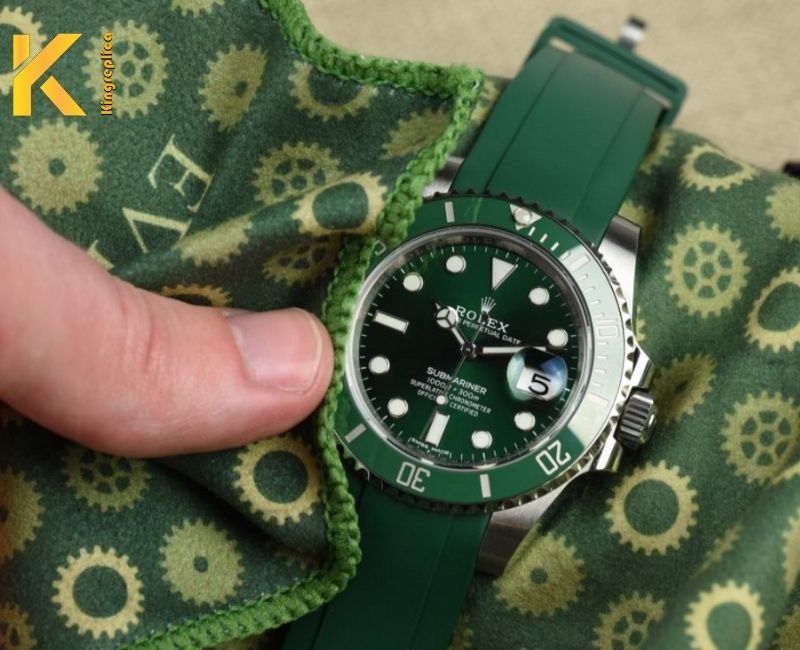A foggy crystal, visible condensation, or a slowing second hand are all warning signs of waterlogged watches. These issues often result from using the watch in unsuitable environments, adjusting the crown underwater, or compromised water-resistant seals. This guide by King Replica helps you identify early signs, explains the common causes, and walks you through simple at-home fixes before seeking professional repair.

1. Recognizing the Signs of a Waterlogged Watch
If the glass becomes misty or tiny droplets of water form inside, your watch has likely been infiltrated by moisture. In more serious cases, you might hear water sloshing when shaking the watch, or notice it running slow or stopping entirely. Rust spots on metal parts may also appear. Left untreated, moisture can damage the movement and shorten the watch’s lifespan.
2. Common Causes of Water Ingress
Here are typical reasons why water may enter your watch:
- Unsecured crown or pushers: If the crown or buttons aren’t fully screwed in, water can easily enter—even if the watch is labeled water-resistant.
- Exceeding water resistance ratings: Every watch has a limit (e.g., 3ATM, 5ATM, 10ATM). Rinsing under strong water jets or swimming with a 3ATM watch can lead to leaks.
- Sudden temperature changes: Moving between hot and cold environments causes air to condense into moisture inside the watch.
- Cracked crystal or case: Impacts against hard surfaces may create micro-cracks, allowing water or sweat to seep in.
- Exposure to chemicals or salt: Sweat, seawater, soap, or gasoline can degrade rubber gaskets, leading to water entry.
- High-heat environments: Hot showers, saunas, or sun exposure can expand rubber seals, reducing their effectiveness.
- Improper battery or crystal replacement: Poor repair work can misalign gaskets or leave openings.
- Lack of maintenance: Over time, rubber seals become brittle or crack, decreasing water resistance.
3. How to Fix a Waterlogged Watch at Home
Act quickly to prevent damage. Here are 8 home remedies to dry your watch safely:
3.1 Place in Rice or Near Desiccant Packs
Rice absorbs moisture naturally. Pull the crown fully outward to vent the case, wrap the watch in tissue, and bury it in dry rice overnight. Alternatively, place it in a sealed box with silica gel packs. This method is safe but slow.

3.2 Wear the Watch Face-Down on Your Wrist
Some people wear the watch inverted to use body heat to evaporate internal condensation. This works only for mild cases and does not remove deep moisture. It’s not recommended for severely waterlogged watches.
3.3 Wipe With a Soft Cloth
If exposure was brief, use a soft, absorbent cloth to dry the case, crystal, and strap thoroughly. Wrap the watch and place it dial-down on a dry surface. This does not work for internal condensation.

3.4 Use a Desk Lamp
A table lamp produces stable heat that can evaporate moisture. Wrap the watch in paper and place it 5–10 cm away from the light for 30–60 minutes. Avoid strong bulbs or placing it too close.
3.5 Dry With a Hairdryer
Use a hairdryer on a cool or low-heat setting. Hold it at least 20 cm away and blow in short intervals (30–60 seconds). Avoid prolonged heat exposure to prevent seal damage.

3.6 Air Dry Naturally
For mild condensation, remove the strap and place the watch dial-down on a dry cloth in a well-ventilated space. This method takes time and is less effective for serious moisture buildup.
3.7 Open the Case for Ventilation
If you’re confident and have the tools, open the case back carefully. Dry the movement with a soft cloth and air it out thoroughly. Incorrect handling may damage seals or introduce dust.
3.8 Seek Professional Repair
If condensation persists, the movement stops, or rust is visible, home remedies won’t be enough. Visit a trusted technician to disassemble, clean, lubricate, and reseal your watch. Early intervention helps prevent circuit shorts and component wear.

4. Tips to Prevent Your Watch from Becoming Waterlogged
- Always check the water-resistance rating (3ATM, 5ATM, etc.) before use.
- Screw down the crown and pushers tightly before water exposure.
- Never adjust the time while the watch is wet or underwater.
- Avoid chemicals and saltwater, which degrade rubber gaskets.
- Have water resistance tested yearly, especially for high-end replica watches.
- Don’t wear the watch in hot showers or saunas.
- Address condensation signs immediately to avoid serious damage.
We’ve walked you through the warning signs, causes, and home remedies for waterlogged watches. If you purchase best replica watches from Dong Ho Che Tac, our technical team offers ongoing support—including moisture checks and repairs. Get in touch with King Replica today for expert care and peace of mind.
